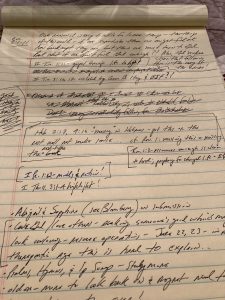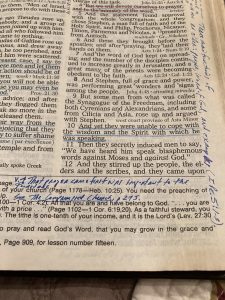Thanks to all of you who were a part of this unscientific, but still revealing poll.
Here is the previous post with all your votes. Below it is the wrap up and a few reflections.
YOUR/MY FAVORITE BOOKS OF THE BIBLE
Number of people who participated: 46
Top four books listed:
First place: Psalms received 34 votes
Second place: Genesis received 33 votes
Third place: John received 31 votes
Fourth place: Romans received 27 votes
(Over twenty of you listed all three of the top three books: Genesis, Psalms, and John)
Number of books in the Bible included on someone’s list: 56/66
32/39 in OT (missing I Chron., Ezra, Joel, Obadiah, Nahum, Haggai, and Malachi)
24/27 in NT (missing II Thess., II and III John)
Most surprising book(s) picked: Tie between Numbers and Zephaniah (But it took two professors to include these books!)
Books picked only one time:
Numbers
II Chronicles (Mrs. Moore)
Lamentations (Only picked by yours truly and I am lamenting that fact!)
Hosea
Amos
Micah
Zephaniah
Zechariah
Titus
Jude
“Brother from another mother” vote: Mark Meynell (a writer and teacher in the UK) was the only other one besides yours truly to include both Ecclesiastes and Habakkuk on his list. May his tribe increase!
Most surprising book(s) not picked: For me, there were no real surprises. I did not expect Nahum or III John to make anyone’s list.
It is a good reminder that the entire Bible is inspired by the Holy Spirit but that does not mean that every book of the Bible is equally important/relevant.
And yet, it should be said that there are gems everywhere in Scripture so reading through the whole of the Bible is indispensable for knowing where these may be found.
Some other reflections:
This exercise confirmed to me that a “Reading the Bible Fast and Slow” method is a good one. See my description of that method here:
https://www.christianitytoday.com/scot-mcknight/2020/january/reading-bible-fast-and-slow.html
I am more convinced than ever that solid growth as a Christian comes from sustained engagement and unhurried reflection on the totality of Scripture.
Having written a commentary on Ecclesiastes I was thrilled by how many put It on their list: fifteen of us!
Another encouragement was seeing how many put I and II Samuel on their lists. These and I and II Kings almost made my own list. Recent meditation on them convinced me even more that they have much to offer.


